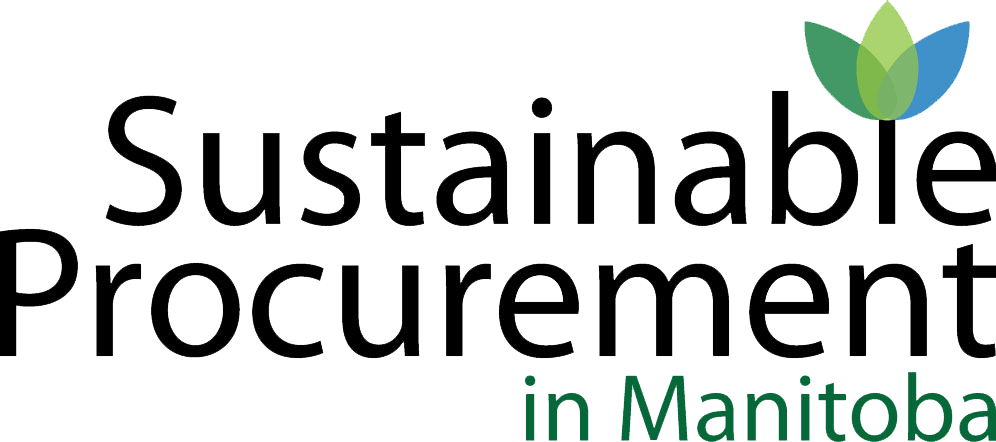You are here
Garbage, Recycling and Compost Bags (Bin Liners)
| Navigation: Minimum Sustainable Recommendations | What are the Issues? | What are the Options? |
Did you know...The familiar green plastic garbage bag was invented in 1950 by Harry Wasylyk from Winnipeg and Larry Hansen of Lindsay, Ontario. Garbage bags were intended for commercial use rather than home use and were first sold to the Winnipeg General Hospital.
Minimum Sustainable Recommendations
Different types of bags are required to line garbage, recycling and compost bins.
When purchasing or developing bid documents for garbage and recycling bags, request the following:
- Garbage bags must be EcoLogo Certified
- Recycling Bags must be transparent and EcoLogo Certified
NOTE: Recycling bags can be coloured but must be transparent to be accepted by staff at recycling facilities. Contents of the bag must be visible to ensure the bag contains only recyclable materials and no garbage or hazardous materials.
If your organization has an organics collection (compost) program and require liners for compost bins, request the following:
- Organic collection (compost) bags must be transparent and Biodegradable Products Institute (BPI) Certified; or meet ASTM D6400 and ASTM D6868 requirements.
NOTE: The BPI certification and ASTM standards ensure the bag will degrade safely and quickly when placed in a commercial composting facility. Compost bags must also be transparent to help staff at the compost facility ensure the bag only contains compostable materials and to prevent other materials from entering compost piles.
Other Things to Consider
If contracted cleaners are responsible for managing garbage, recycling and compost bins in your organization, make sure to include the above specifications in cleaning service contracts. In addition, ensure the size of the bag purchased is congruent with the size of the bins.
For information on establishing an organic/compost collection program in your organization, please see “Organic Waste Pick-up Services” under the waste management section of the Goods & Services tab.
What are the issues?
Garbage Bags and Recycling Bags
The impact of plastic bags on the environment throughout their lifecycle includes greenhouse gas emissions and pollution from extracting and refining the petroleum or natural gas needed to make the plastic. There are also toxins such as lead and mercury in the inks and dyes used to colour the plastic bag. In addition, energy and water is required to manufacture the plastic bags. Lastly, there are emissions associated with transporting them to market.
Once produced, the plastic bag never really disappears. It cannot be broken down into biodegradable compounds. Given enough time and sunlight the bag will “degrade” into smaller and smaller pieces, but the same amount of plastic material still exists, just in pieces. When garbage bags are buried in a landfill (oxygen-free environment) it will shrink, but does not go away. Finally, if plastic garbage bags are burned, the plastic releases most of its toxic components into the atmosphere.
In some instances, cleaners may (unintentionally) line recycling bins with non-transparent black bags. Black bags containing recyclable materials will not be accepted at the commercial recycling facility. Staff at recycling facilities require bags to be transparent to help them determine if the bag contains recyclable materials to avoid contaminating recycling piles. Non-transparent bags are not opened at the recycling facility and are placed in the landfill.
Compost bags
If your organization has a compost collection program, bins can be lined with compostable/biodegradable bags. However, there are some bags in the market that claim to be compostable and biodegradable but do not degrade properly and/or safely when sent to a commercial composting facility. These bags may contaminate compost piles at the commercial composting facility and render some of the compost unusable.
What are the options?
Garbage and Recycling Bags
The use of plastic bags to help manage waste is a standard practice. The opportunities to reduce the impacts associated with the bags are minimal. One way to reduce the impact is to purchase bags with post consumer waste (PCW) content.
Plastic bags made with post consumer waste (recovered material) include high density polyethylene (HDPE), low density polyethylene (LDPE), and linear low density polyethylene (LLDPE) bags. The amount of recovered materials used in the manufacturing process can affect the color, size and thickness of the bag. The performance of the trash bag depends on the type of resin chosen as well as the thickness. This is not impacted by recycled content. ASTM Standard D882 is used to evaluate the strength of the bag regardless of its recycled content.
EcoLogo provides criteria for certification by focusing on post consumer waste content but also prohibits the use of a number of plastic additives including toxic inks.
Also, in order for recyclables to be accepted at the commercial recycling facility, bags used to line recycling bins must be transparent. There are many transparent EcoLogo certified plastic bags available in the market. Different types of bags for garbage (black) and recycling (transparent) can also help in-house or contracted cleaners determine which bags contain garbage and recycling.
Compost Bags
The Biodegradable Products Institute (BPI) provides criteria for certification of numerous compostable/biodegradable products, including compostable bags. To obtain certification, BPI tests products based on scientific methods and ensure all products meet American Standards for Testing and Materials (ASTM) standards for films (ASTM-D6400) and standards for packaging which uses biodegradable coatings (ASTM -D6868). These standards ensure compostable products will biodegrade at a rate comparable to organic materials such as food scraps and yard trimmings and into compost that supports plant growth.
Last updated: January 2019
Theme by Danetsoft and Danang Probo Sayekti inspired by Maksimer
